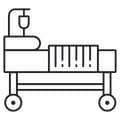A blood clot in a deep vein, usually in the legs, is called a deep vein thrombosis (DVT). A DVT can break loose and travel through the bloodstream to the lungs. Then the clot can block blood flow in the lungs (pulmonary embolism). This can be life-threatening. That's why it's important to take steps to prevent a clot.

Take a blood-thinning medicine (called an anticoagulant), if prescribed. If your doctor prescribes medicine, take it as directed.

Exercise your lower leg muscles. This helps keep the blood moving through your legs. Pump your feet up and down by pulling your toes up toward your knees then pointing them down. Repeat. This is a good exercise to do when you are sitting for long periods of time.

Get up out of bed as soon as your doctor says it's okay. Being active is one of the best things you can do to prevent clots.

Take plenty of breaks when you travel. On long car trips, stop the car and walk around every hour or so. On the bus, plane, or train, get out of your seat and walk up and down the aisle every hour, if you can.

Be active. Try to get 30 minutes or more of activity on most days of the week.

Don't smoke. Smoking can increase your risk of blood clots. If you need help quitting, talk to your doctor about stop-smoking programs and medicines.

Check with your doctor about your risk for blood clots if you use hormone forms of birth control or any type of hormone therapy. These may increase your risk of blood clots.

Use compression stockings if your doctor prescribes them. These are specially fitted stockings that may prevent blood clots by keeping blood from pooling in your legs.









